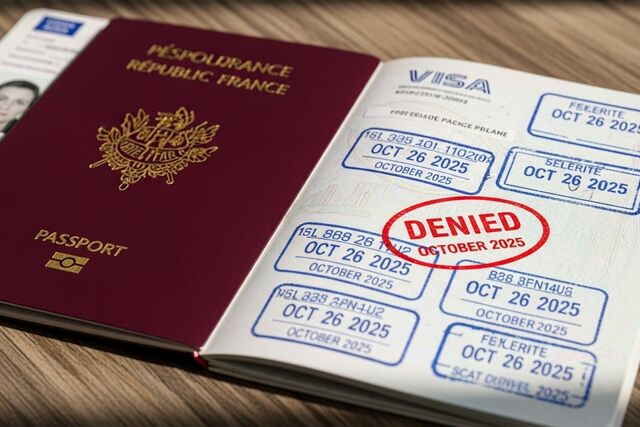What happens if you overstay your Schengen visa?
Overstaying your Schengen visa, even by just one day, can cause serious problems. Fines and deportation, re‑entry bans, and a damaged travel history... the consequences are significant.
This article explains what overstaying means, why it matters, the possible consequences, and how to avoid finding yourself in trouble.

What does overstaying mean
Overstaying happens when you remain in the Schengen Area beyond your permitted time. For most travelers, this is a maximum of 90 days within any 180‑day period or staying beyond your visa expiry date. This applies whether you are on a visa or travelling under a visa waiver.
If you are unsure how the 90/180 rule works, check our guide, Understanding the Schengen Area’s 90/180 rule: how long can you really stay?
Why overstaying is a serious matter
If you overstay and have not provided a valid reason for it, you can expect:
Fines and penalties
Most Schengen countries impose fines for overstays. These fines increase the longer you overstay and differ from country to country. For example:
- In Germany, fines can reach up to €3,000.
- In Portugal, fines for short overstays are smaller but still involve a formal record.
Deportation or forced exit
Authorities may deport you if you overstay. In cases involving illegal work or other violations, this can result in detention, trials, and criminal charges.
Entry ban/blacklisting
Overstays are logged in immigration systems. This makes future visa applications for tourism, business, or long stays harder to obtain.
A re‑entry ban can last from a few months to several years depending on the severity of the overstay and the country involved. You could be refused entry to the entire Schengen Area, not just the country where the overstay occurred.
Insurance expiry
Travel insurance connected to your visa usually ends with your permitted stay. If you overstay, coverage can be voided, leaving you without protection for medical or other emergencies.
How to fix or reduce the consequences of overstaying?

Sometimes overstaying is unavoidable. If you find yourself in that situation:
1. Contact the authorities immediately
Inform immigration or police as soon as possible. If you have a credible reason for overstaying, authorities may be more understanding.
2. Gather evidence
Collect proof of the reason for your overstay, such as medical records or flight cancellation documents. This will support your case and may reduce penalties.
3. Seek legal advice
For serious or prolonged overstays, consult an immigration lawyer or adviser. They can guide you through appeals, negotiations, and legal procedures. Always return home as soon as it is possible.
How to plan your trip to avoid overstaying

- Calculate your days carefully. Ensure you do not exceed the permitted stay in the Schengen Area.
- Apply for extensions early. If delays or emergencies occur, request an extension before your visa expires.
Maintain valid insurance. If you plan to extend your trip, check that your travel insurance covers the extra days.
Preparation is key. Travel confidently by checking visa requirements ahead of time and using reliable tools to calculate your days and apply for the correct permits.
FAQ
Q1: Can I reset my 90 days by leaving the Schengen Area?
No. The 90/180 rule is calculated on a rolling basis. Leaving does not reset the count until enough days have passed.
Q2: What happens if I accidentally overstay by one day?
Even a single day overstay can result in fines, deportation, or bans. Penalties depend on the country and severity. Contact the authorities immediately.
Q3: Can overstaying affect future travel?
Yes. Overstays are recorded in immigration systems and can make future visas or entry to Schengen countries harder to obtain.
Q4: How can I check my allowed Schengen days?
Use the official Schengen short‑stay calculator or keep track of your travel days carefully.
Conclusion
Overstaying your Schengen visa is a serious matter that can have lasting consequences. Knowing the rules, planning your trip carefully, and acting quickly if problems arise are the best ways to protect your travel record.
Travel should be about exploration, not bureaucracy. By preparing ahead, you can enjoy your time in Europe without fear of overstaying.